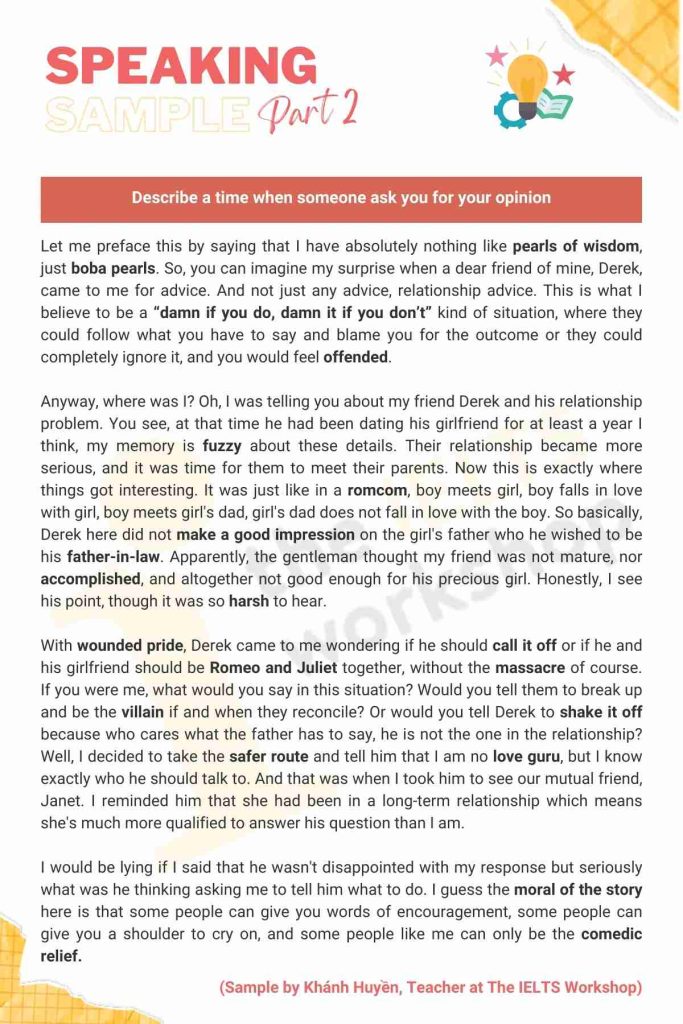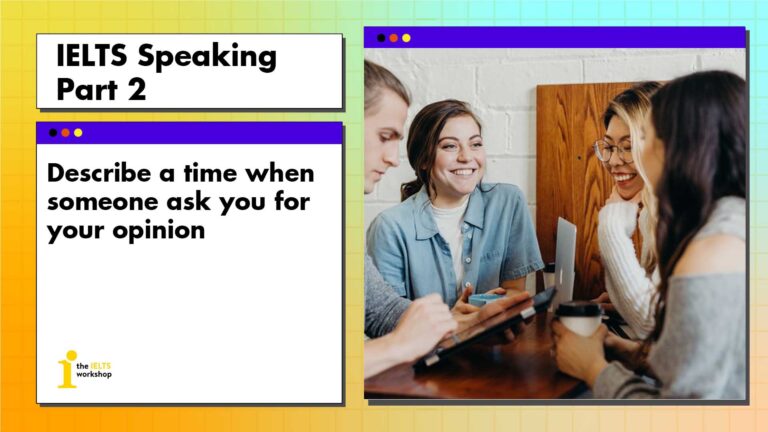Trong chuyên mục Giải đề IELTS Speaking kỳ này, ta sẽ tìm hiểu topic: Describe a time when someone ask you for your opinion trong IELTS Speaking Part 2. Cùng tham khảo sample, từ vựng theo chủ đề và một vài cách diễn đạt ghi điểm nhé.
Part 2: Describe a time when someone ask you for your opinion
Describe a time when someone ask you for your opinion
You should say
Who asked for your opinion
Why he/she wanted to know your opinion
What opinion you gave
And explain how you felt when he/she asked for your opinion
1. Bài mẫu (Sample)
Sample 1

Sample 2
2. Từ vựng (Vocabulary)
Sample 1
- pearls of wisdom: (idiom) lời khuyên khôn ngoan (usually used ironically here)
- boba pearls: trân châu (in bubble tea)
- damn if you do, damn it if you don’t: (idiom) tiến thoái lưỡng nan, làm gì cũng dở
- offended: (adj) bị xúc phạm
- fuzzy: (adj) mơ hồ, không rõ ràng
- romcom: (n) phim hài lãng mạn (romantic comedy)
- make a good impression: (phrase) tạo ấn tượng tốt
- father-in-law: (n) bố vợ/chồng
- accomplished: (adj) thành đạt
- harsh: (adj) khắc nghiệt, cay nghiệt
- wounded pride: (n) lòng tự trọng bị tổn thương
- call it off: (phrasal verb) chia tay, kết thúc
- Romeo and Juliet: (n) Romeo và Juliet (ám chỉ một chuyện tình bi kịch)
- massacre: (n) vụ thảm sát
- villain: (n) kẻ phản diện
- shake it off: (phrasal verb) phớt lờ, bỏ qua
- safer route: (n) cách an toàn hơn
- love guru: (n) quân sư tình yêu (chỉ người đưa ra lời khuyên về tình yêu)
- moral of the story: (phrase) bài học rút ra là
- comedic relief: (n) yếu tố gây cười
Sample 2
- reluctant (adj) lưỡng lự
- perspective (n) góc nhìn
- journey (n) hành trình
- lead someone astray: dẫn ai đó đi lạc hướng
- judgment (n) sự phán xét
- compromise (v) thỏa hiệp
- sugarcoat (v) bọc đường, tô vẽ
- flattered (adj) tâng bốc
- dodge responsibility: né tránh trách nhiệm
- insist (v) khăng khăng
- give in (v) nhượng bộ
- genuinely (adv) chân thật
- go out: hẹn hò
Xem thêm: Describe a house or an apartment you would like to live in | IELTS Speaking Part 2
Part 3:
Bên cạnh Part 2, bạn hãy tham khảo thêm Part 3 cho chủ đề này nhé
What should a company do when receiving feedback about its products?
Should teachers give advice to children?
What are the disadvantages of sharing opinions on the Internet?
Why do people like to express their opinions on the Internet nowadays?
Are there any apps designed for collecting opinions about products or services?
Why do some people dislike giving their opinions?
1. What should a company do when receiving feedback about its products?
This is a tough one, as I’m no business owner. But from a customer’s standpoint, I would say they should be elated to have an opportunity to make a change. I would suspect that the most common reason why the buyers find it necessary to voice their opinions is because of an unpleasant encounter. Say, they have bought some jeans but find them too small or too large for their size or they’ve got a cup of coffee that tastes like dirt but not because it was ground that morning. When the store owner or their customer service department is aware of these potential problems, they now have the chance to make things right, to adjust, and to please their customers.
But then again, whatever the feedback is, positive or negative, it is a good sign that the clientele is comfortable enough to share their experience with the brand. So, for that reason, every business should be grateful to receive feedback.
- tough one: (phrase) câu hỏi khó
- elated: (adj) rất vui mừng
- to voice their opinions: (phrase) bày tỏ ý kiến của họ
- unpleasant encounter: (n) trải nghiệm khó chịu
- make things right: (phrase) sửa sai
- clientele: (n) tệp khách hàng
- be grateful: (adj) biết ơn
2. Should teachers give advice to children?
I don’t see why not. It is their job to teach, to raise awareness, and to inform. So, in that sense, giving consultants to students is one way to achieve this goal. Just to build on that, I suppose the most crucial advice that high school students need is university choices, which may affect their future career path. Their parents may not be as equipped to answer their questions while teachers could be familiar with their shortcomings as well as their strengths and interests.
- raise awareness: (phrase) nâng cao nhận thức
- equipped: (adj) được trang bị
- shortcomings: (n) thiếu sót
- strengths and interests: (phrase) điểm mạnh và sở thích
3. What are the disadvantages of sharing opinions on the Internet?
I don’t even know where to begin with this question. The first thing that comes to my mind is controversy. What I mean by this is the virtual world is such an open space where users of different age groups, and backgrounds, and financial situations can chime in and pick at what you have to say. You may share something that seems so trivial like “I like pineapples on pizza” and suddenly you are receiving thousands of hateful comments saying how wrong you are. And not all of us are equipped with the emotional strength to handle such a situation. On top of that, you should also be aware of the potential ripple effect your view can have on a certain discourse. The Internet has this powerful force to polarize communities and before you know it, a silly argument on pizza toppings has turned into a screaming match.
- controversy: (n) tranh cãi
- virtual world: (n) thế giới ảo
- chime in: (phrasal verb) tham gia vào cuộc trò chuyện
- pick at: (phrasal verb) chỉ trích, bắt lỗi
- trivial: (adj) tầm thường
- ripple effect: (n) hiệu ứng gợn sóng, ảnh hưởng lan rộng
- discourse: (n) cuộc thảo luận
- to polarize communities: (phrase) phân cực cộng đồng
- screaming match: (n) cuộc cãi vã nảy lửa
4. Why do people like to express their opinions on the Internet nowadays?
The first thing that springs to my mind is anonymity. Do you remember in the old days when forums were so prevalent, anyone can log in to share their experience without revealing anything about themselves? I guess it is still possible today on certain social media platforms like TikTok or Instagram. Being anonymous allows us to be self-confident and self-assured as the audience are clueless about the speakers. And this thin veil works both ways too. If you don’t know who you are talking to, and how they respond to your content in real time, you are relieved of the emotional burden to choose your words wisely.
- springs to my mind: (phrase) điều đầu tiên tôi nghĩ đến là
- anonymity: (n) sự ẩn danh
- prevalent: (adj) phổ biến
- clueless: (adj) không biết gì
- thin veil: (n) tấm màn mỏng (ám chỉ sự ẩn danh)
- works both ways: (phrase) có hai mặt
- emotional burden: (n) gánh nặng cảm xúc
5. Are there any apps designed for collecting opinions about products or services?
Not that I know of, though I would make a wild guess and say it’s any messaging services. It is not a surprise that social media are tracking us and eavesdropping on any conversation we have with our friends and families. The algorithm is picking up on keywords to have an insight into our needs and wants and desires. I guess they are also aware of our experience with any service that we use but I am not sure what they are doing with that information
- wild guess: (n) đoán mò
- eavesdropping: (verb) nghe lén
- algorithm: (n) thuật toán
- insight into: (phrase) hiểu biết sâu sắc về điều gì
6. Why do some people dislike giving their opinions?
I have two theories on this. The first is that they are afraid not of their views but the repercussions of sharing their views. Let’s circle back to that pineapple pizza comment, which is such an inane thing to say to someone like me, Vietnamese. But to the Italians, it would be considered a blasphemy, and the speaker should be stoned to death because of it. The second hypothesis, which is my personal favorite, is that so many people actually do not have a stance on anything at all. They could be indifferent to their own feelings, be it on the weather or climate change. If you ask them what they think about policy changes, they may realize they are not informed or even aware of political issues. Hence, they dread it when they have no words on the matter.
- repercussions: (n) hậu quả
- inane: (adj) ngớ ngẩn
- blasphemy: (n) sự báng bổ
- stoned to death: (phrase) bị ném đá đến chết
- hypothesis: (n) giả thuyết
- stance on something: (phrase) quan điểm về điều gì
- indifferent: (adj) thờ ơ
- dread something: (verb) sợ hãi điều gì
Bài mẫu bởi cô Khánh Huyền và cô Hoài Thương – Giáo viên The IELTS Workshop
Trên đây là bài mẫu IELTS Speaking Part 2 Describe a time when someone ask you for your opinion mà bạn có thể tham khảo. Để có thể nâng cao khả năng làm Speaking, bạn có thể tham khảo khóa Senior của The IELTS Workshop để nâng band dễ dàng hơn nhé.









